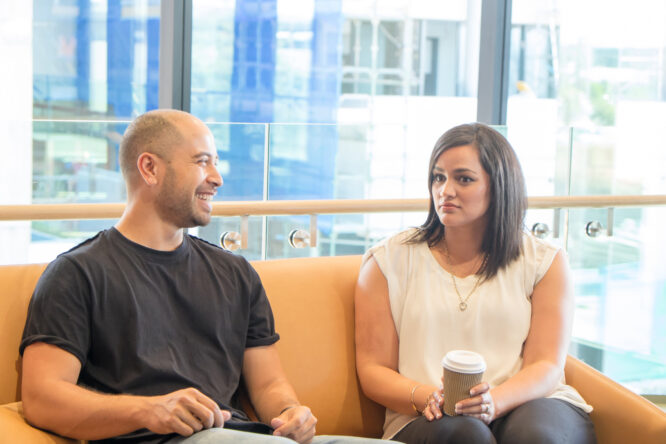Loving someone with ADHD means learning to see the world through their lens.

How much of an adjustment that takes depends on the effects they experience, as well as the severity. You shouldn’t be trying to fix them, though. Instead, you should focus on understanding what helps them feel seen, safe, and genuinely supported every day.
1. Be patient with their pace, not just their energy.

People with ADHD often have bursts of energy, but that doesn’t mean they move through life on a predictable timeline. One day they might be hyperfocused, smashing through tasks with laser intensity, and the next they might struggle to start something as simple as getting dressed. It’s not laziness; it’s how their brain works, and it changes day to day, sometimes hour to hour.
Instead of rushing them or assuming they’re unmotivated, try meeting them where they are. Patience isn’t just about waiting; it’s about offering steady support without judgement. Letting them know they don’t have to perform at a constant pace to be loved gives them room to breathe and trust that your care isn’t conditional.
2. Don’t take forgetfulness personally.

Missed texts, forgotten dates, or zoning out mid-conversation can feel hurtful, but they’re rarely about disinterest. ADHD impacts short-term memory and focus in frustrating ways, and even things they deeply care about can slip through the cracks. It’s often as upsetting to them as it is to you, especially if they’re trying really hard not to disappoint anyone.
When you understand that forgetfulness is part of how their brain operates, not a reflection of how much they care, you start noticing the ways they express love that go beyond remembering plans. Gentle reminders help, but compassion goes further. They’re likely carrying guilt already; your understanding can be a lifeline.
3. Give gentle structure, not pressure.

ADHD and structure have a complicated relationship. On one hand, routine helps them stay grounded. On the other, rigid systems can feel overwhelming or impossible to maintain. They often want to stay organised, but just don’t know how to get there, or how to keep it up consistently once they do.
That’s where supportive structure comes in. Helping them break down big tasks into smaller ones, talking things through instead of barking orders, or offering quiet accountability can make a big difference. What matters is the tone—guidance feels helpful, but pressure can shut them down. Being a calm presence in the chaos is more powerful than pushing for control.
4. Understand that their brain doesn’t rest the same way.

Stillness isn’t always restful for someone with ADHD. Even when the room is quiet, their mind might be full of tabs open, thoughts racing, ideas colliding. They might struggle with traditional forms of rest like lying on the sofa or meditating, and feel more recharged by movement, background noise, or creative outlets.
This can be misunderstood as restlessness or avoidance, but often it’s just them finding the kind of rest that actually works for them. Letting them recharge in their own way, without making them feel guilty for not relaxing “properly,”makes them feel accepted, not criticised. Rest doesn’t have to look the same for everyone.
5. Don’t expect linear communication.

Conversations might jump from one topic to another, circle back, or veer off mid-sentence. It’s not confusion; it’s just how their brain works. Thoughts don’t always come in a neat line, and sometimes it feels like everything’s firing at once, which makes it tough to filter or organise ideas on the spot.
If you can hang in there and follow the flow, you’ll likely be surprised by the insight, humour, and perspective they bring. It might not always be polished, but it’s often full of honesty and creativity. Instead of correcting their style, try listening for what they’re really saying, and how much trust it takes for them to say it at all.
6. Celebrate their hyperfocus instead of feeling left out.

When something sparks their interest, they can fall into deep hyperfocus, spending hours or days diving into a passion or project. It might feel like they’ve disappeared into another world, and that can be tough if you’re feeling left out or ignored. However, their focus isn’t about escaping you; it’s how their brain locks in when something fully grabs them.
Instead of pulling them out of it, try joining them in it or encouraging it from the sidelines. Let them share what they’re working on when they come up for air. Their passion is part of who they are, and when you make space for it without taking it personally, it becomes something that brings you closer rather than drives a wedge.
7. Don’t shame the mess.

Their room might look like chaos, the laundry might pile up, or the to-do list might go untouched for days. It’s not because they don’t care; it’s often because executive dysfunction gets in the way of starting or finishing even basic tasks. The mess isn’t a lack of effort; it’s usually the result of mental overload.
Criticism just adds to the guilt they probably already feel. What helps is offering kindness, and if it’s welcome, a bit of help. Even sitting beside them while they tidy or offering small, doable suggestions can make the whole thing feel less overwhelming. Sometimes support looks like patience, not problem-solving.
8. Appreciate their creativity, not just their quirks.

People with ADHD often make connections no one else does. They bring colour, humour, and big-picture ideas into the world around them. Their minds might move fast, but that speed often leads to bursts of innovation or playfulness that are downright contagious.
When you praise more than just the “quirky” traits and genuinely admire the creative depth they bring, it builds their confidence. They’ve likely been told for years that they’re “too much” or “all over the place.” Hearing that their way of thinking is a strength helps them see themselves through kinder eyes.
9. Give them space to fidget, move, or stim without judgement.

You might notice them tapping, pacing, bouncing a leg, or playing with something in their hands while talking. These movements aren’t signs of distraction; they’re often how someone with ADHD regulates themselves and stays engaged. Suppressing that need can actually make focus harder, not easier.
Allowing them to move or stim freely, especially during conversations or tasks, tells them they don’t need to mask their needs around you. That kind of acceptance makes them feel safer, more connected, and more likely to be fully present in the relationship.
10. Remind them they’re not a burden.

Many people with ADHD carry a quiet shame—this fear that they’re always disappointing someone, taking too long, or being “too much.” They’re often harder on themselves than anyone else ever could be. So when they mess up or forget something, they might spiral quickly into self-blame.
Your words matter here. Telling them they’re loved as they are, even on their rough days, can be a powerful reset. Reassurance isn’t enabling; it’s a reminder that they don’t have to be perfect to be worthy of love. And sometimes, that’s all they need to keep going.
11. Be clear, not passive-aggressive.

Passive hints, sarcasm, or emotional guessing games don’t land well when someone struggles with reading between the lines. ADHD can make it hard to pick up on subtleties, especially if they’re already mentally stretched. What feels like an obvious cue to you might not even register for them.
Being clear, kind, and direct is actually a gift. It removes the guessing and gives them a chance to meet your needs without confusion. And in return, they’ll likely feel safer being open and honest with you, too.
12. Expect emotions to come on strong sometimes.

ADHD affects emotional regulation just as much as attention. That means little things might trigger big feelings, or emotions might hit harder and take longer to settle. They’re not being dramatic; they just feel things deeply and all at once.
When you don’t shame them for reacting strongly, they learn that emotions don’t make them “too much.” You don’t have to fix it; just being present, validating their feelings, and helping them ride the wave is often more than enough.
13. Be flexible with plans, and forgiving of time.

Time doesn’t work the same way for someone with ADHD. They might have every intention of being on time, but suddenly two hours disappear. Getting out the door, managing transitions, or even estimating how long something takes can feel impossible some days.
Planning with a bit of wiggle room, sending gentle reminders, or keeping a shared calendar can help reduce stress on both sides. More than anything, offering understanding rather than frustration builds trust, and helps them feel like they’re not failing just for being late.
14. Love them for their heart, not in spite of their challenges.

ADHD can bring obstacles, sure, but it also brings enthusiasm, empathy, playfulness, and a unique kind of loyalty. When someone with ADHD loves you, they often do it with their whole heart. They’re attentive to the little things, generous with affection, and fiercely supportive in their own way.
Loving them well means celebrating their full selves, not just the “manageable” parts. It’s not about fixing anything. It’s about showing up, consistently, in a way that says: “I see you. I get you. And I’m still here.” That kind of love gives them the space to fully be themselves, and when that happens, you get the best version of them, too.




